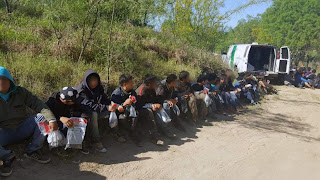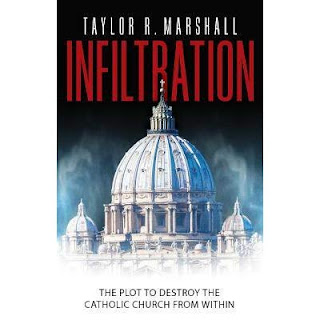Immigration and the Catholic Response
 Neither Democrats nor Republicans deny that we have a humanitarian crisis at the southern border of the United States. People are living in less than ideal conditions. Border Patrol and other law enforcement and government entities are overwhelmed by the sheer numbers that have come. Food, water, and other basic necessities are lacking for these people in need.
Neither Democrats nor Republicans deny that we have a humanitarian crisis at the southern border of the United States. People are living in less than ideal conditions. Border Patrol and other law enforcement and government entities are overwhelmed by the sheer numbers that have come. Food, water, and other basic necessities are lacking for these people in need.The question is, how are we, as Catholics, to view and respond to this situation? A friend of mine recently asked me for my thoughts on a podcast discussing this very thing.
First, it should be obvious that, as a Catholic, I am sympathetic to their arguments. Nobody of goodwill would deny the essential dignity of each and every human being. What I take issue with is when they, and other Catholics, use this as a bludgeon against those who support immigration restrictions or reform as being somehow racist, white supremacist, or xenophobic (all three terms are used). They paint them as being anti-immigration. Nothing could be further from the truth, for the distinction is between legal and orderly immigration and illegal, disorderly, and thus harmful to everyone affected, both migrant and citizen.
They believe the narrative that paints a romantic picture of all these migrants as desperate and fleeing persecution. They believe the narrative that everybody comes here to work hard and not to take advantage of the welfare system. They believe the narrative that all of U.S. immigration law is unjust and thereby justifies civil disobedience.
They ignore the practical application of that civil disobedience in terms of sanctuary cities is to jeopardize the safety of those communities, including immigrants who came here legally. They ignore the human and sex trafficking. They ignore the exploitation of children to get into our country (over 2,000 false families have been identified). They ignore the fact that caravan members openly admitted that there were criminals among them, and they ignore that these migrants refused job offers in Mexico as well as expressed overt ingratitude for the food that was given them despite the givers' own poverty.
So what does the Church really teach regarding immigration and how are we to respond?
In the podcast interview, only a passing reference is made to the right of nations to regulate borders. It is then passed off as not absolute using the argument that the modern nation-state is something new.
The problem of this argument is that it's a red herring. The moral duties of civil authority don't change with the form. The relationship with foreigners doesn't change whether or not there are fixed borders.
The primary moral duty of any civil authority is the common good of those they govern. Part of the common good is the safety of its citizens. This means that it is morally bound to determine which foreigners are peaceful and which are hostile. The current situation at the border hinders the ability of the civil authority to fulfill its obligation and liberally minded Catholics would have us undermine the duty of legitimate authority. The civil disobedience they advocate for would put people at risk.
And in regards to civil disobedience specifically, civil disobedience is justified in the case of objectively unjust laws. U.S. immigration law in its entirety cannot be said to be absolutely unjust. Cumbersome and inconvenient, surely, but certainly not unjust. The Church teaches us to obey civil authority even if a law is inconvenient.
To be made in the image and likeness of God means that we have intellect and will. We are free moral agents and bear responsibility for our actions. We are also wounded by original sin. There are people who seek to do harm. There really are people who refuse to integrate into the communities they emigrate to (notably Muslims who are now trying to enforce sharia law), and this is documented fact that these and other liberally minded Catholics tend to ignore.
No one is advocating the wholesale deportation of legitimate refugees seeking a better life. Christ did command us to clothe the naked and feed the hungry in His name. Yet the same Jesus who commands these things also made a whip and turned over the tables of the moneychangers, expelling them from the Temple. Why? Because these were morally corrupt people causing grave harm.
The truth is that there is a lot more at stake in the immigration crisis than human dignity. There are factors of political power for both Democrats and Republicans; there is the moral duty of states to determine who's hostile and who's peaceful; there's the spiritual battle against the smoke of Satan that seeks to distract us from our eternal goal and make the Church into a social justice organization.
To take the arguments given in this interview and elevate human dignity out of its proper context, isolated from the rest of the picture, especially Catholic teaching, is to cause grave harm. It runs the risk of believing a romanticized narrative divorced from reality. In the extreme, it is saying to those who've lost children to illegal aliens that their grief doesn't really matter (Elizabeth Warren already has).
By all means, we should welcome refugees. We should feed them, clothe them, and help them gain a life of true freedom. But we should not do so in a way as to endanger the safety of citizens or, for that matter, the safety of the migrants who are being exploited.



Comments
Post a Comment